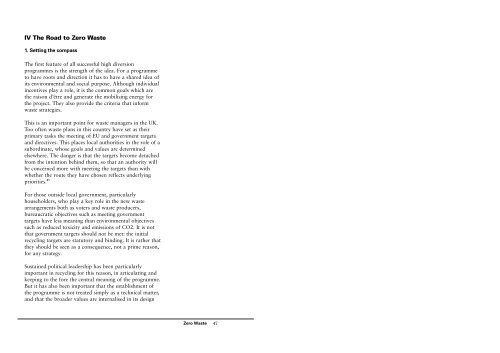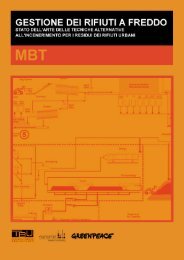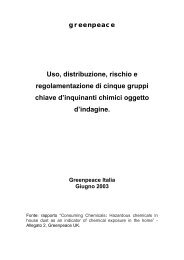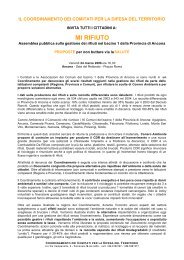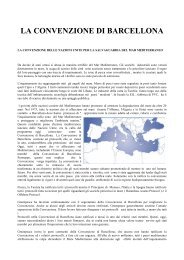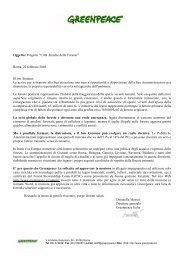Zero Waste by Robin Murray, Greenpeace Environmental Trust 2002
Zero Waste by Robin Murray, Greenpeace Environmental Trust 2002
Zero Waste by Robin Murray, Greenpeace Environmental Trust 2002
Create successful ePaper yourself
Turn your PDF publications into a flip-book with our unique Google optimized e-Paper software.
IV The Road to <strong>Zero</strong> <strong>Waste</strong><br />
1. Setting the compass<br />
The first feature of all successful high diversion<br />
programmes is the strength of the idea. For a programme<br />
to have roots and direction it has to have a shared idea of<br />
its environmental and social purpose. Although individual<br />
incentives play a role, it is the common goals which are<br />
the raison d’être and generate the mobilising energy for<br />
the project. They also provide the criteria that inform<br />
waste strategies.<br />
This is an important point for waste managers in the UK.<br />
Too often waste plans in this country have set as their<br />
primary tasks the meeting of EU and government targets<br />
and directives. This places local authorities in the role of a<br />
subordinate, whose goals and values are determined<br />
elsewhere. The danger is that the targets become detached<br />
from the intention behind them, so that an authority will<br />
be concerned more with meeting the targets than with<br />
whether the route they have chosen reflects underlying<br />
priorities. 41<br />
For those outside local government, particularly<br />
householders, who play a key role in the new waste<br />
arrangements both as voters and waste producers,<br />
bureaucratic objectives such as meeting government<br />
targets have less meaning than environmental objectives<br />
such as reduced toxicity and emissions of CO2. It is not<br />
that government targets should not be met: the initial<br />
recycling targets are statutory and binding. It is rather that<br />
they should be seen as a consequence, not a prime reason,<br />
for any strategy.<br />
Sustained political leadership has been particularly<br />
important in recycling for this reason, in articulating and<br />
keeping to the fore the central meaning of the programme.<br />
But it has also been important that the establishment of<br />
the programme is not treated simply as a technical matter,<br />
and that the broader values are internalised in its design<br />
<strong>Zero</strong> <strong>Waste</strong><br />
47


